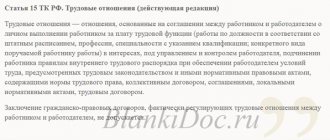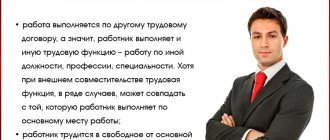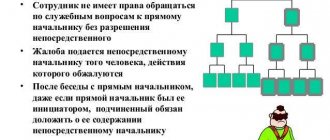For example, a rental manager’s employment contract will be drawn up in such a way as to maximally regulate activities related to interaction with clients in terms of:
- demonstrations of objects for rent;
- interaction with potential, current and former clients;
- settlement of pre-trial disputes;
- signing working documentation within the framework of delegated powers, etc.
General points
Any contract must specify:
- labor function;
- time of work and rest;
- information about wages, including interest, if the parties have agreed on this;
- date and place of his imprisonment;
- employer information;
- information about the employee;
- duration of the contract and start date of work;
- terms of remuneration;
- date of conclusion and signatures of both parties.
The document must be certified by the employer's seal.
Employment contract with manager
EMPLOYMENT AGREEMENT WITH THE MANAGER
____________________________________ “__” _________ 200__ (name of the place of conclusion of the agreement) _________________________________________________, located at the address: (name of the legal entity) _______________________________________________________, registered (address) __________________________________________________________________________, (name of the registering authority, date, number of the registration decision) represented by the general director ___________________________________ , hereinafter referred to as “Employer”, on the one hand, and __________________________, (F.I.O.) hereinafter referred to as “Employee”, on the other hand, entered into an agreement as follows.
1. Subject of the agreement 1.1. An employee is hired as a manager.
1.2. This agreement is an agreement (underline as appropriate):
at the main place of work;
at the same time.
2. Duration of the contract
2.1. This agreement is concluded for an indefinite period.
2.2. The employee undertakes to begin fulfilling the duties provided for in clause 1.1, paragraph 3 of this agreement, ____________________________. (indicate start date of work) 2.3. This agreement establishes a probationary period of __________________________________________________________________________. (duration of probationary period, but not more than 3 months)
3. Rights and obligations of the Employee
3.1. The employee has the right to:
3.1.1. Providing him with work stipulated by the employment contract.
3.1.2. A workplace that meets the conditions provided for by state standards of organization and labor safety and the collective agreement.
3.1.3. Complete reliable information about working conditions and labor protection requirements in the workplace.
3.1.4. Protection of personal data.
3.1.5. Duration of working hours in accordance with current legislation.
3.1.6. Time relax.
3.1.7. Payment and labor regulation.
3.1.8. Receipt of wages and other amounts due to the Employee on time (in case of delay in payment of wages for a period of more than 15 days - suspension of work for the entire period until payment of the delayed amount with written notification to the Employer, except for the cases provided for in Article 142 Labor Code of the Russian Federation).
3.1.9. Guarantees and compensations.
3.1.10. Vocational training, retraining and advanced training.
3.1.11. Labor protection.
3.1.12. Association, including the right to create trade unions and join them to protect their labor rights, freedoms and legitimate interests.
3.1.13. Participation in the management of the organization in the forms provided for by the Labor Code of the Russian Federation, other federal laws and the collective agreement.
3.1.14. Conducting collective negotiations and concluding collective agreements and agreements through their representatives, as well as information on the implementation of the collective agreement and agreements.
3.1.15. Protection of your labor rights, freedoms and legitimate interests by all means not prohibited by law.
3.1.16. Resolution of individual and collective labor disputes, including the right to strike, in the manner established by the Labor Code of the Russian Federation and other federal laws.
3.1.17. Compensation for harm caused to the Employee in connection with the performance of his job duties, and compensation for moral damage in the manner established by the Labor Code of the Russian Federation and other federal laws.
3.1.18. Compulsory social insurance in cases provided for by federal laws.
___________________________________________________________________________ ___________________________________________________________________________ (other rights in accordance with current legislation)
3.2. The employee is obliged:
3.2.1. Manage the entrepreneurial or commercial activities of an enterprise, institution, organization aimed at meeting the needs of consumers and generating profit through stable operation, maintaining business reputation and in accordance with the powers granted and allocated resources.
3.2.2. Based on the strategic goals of the enterprise, institution, organization, plan entrepreneurial or commercial activities.
3.2.3. Monitor the development and implementation of business plans and commercial conditions, concluded agreements, agreements and contracts, assess the degree of possible risk.
3.2.4. Analyze and solve organizational, technical, economic, personnel and socio-psychological problems in order to stimulate production and increase sales volumes, improve the quality and competitiveness of goods and services, economical and efficient use of material, financial and labor resources.
3.2.5. Carry out the selection and placement of personnel, motivate their professional development, evaluate and stimulate the quality of work.
3.2.6. Organize connections with business partners, a system for collecting the necessary information to expand external relations and exchange experience.
3.2.7. Analyze demand for manufactured products or services, forecast and motivate sales by studying and assessing customer needs.
3.2.8. Participate in the development of innovation and investment activities, advertising strategies related to the further development of entrepreneurial or commercial activities.
3.2.9. Ensure increased profitability, competitiveness and quality of goods and services, increased labor efficiency.
3.2.10. Coordinate activities within a certain direction (area), analyze its effectiveness, make decisions on the most rational use of allocated resources.
3.2.11. Involve consultants and experts on various issues (legal, technical, financial, etc.) in solving problems.
3.3. The employee must know:
3.3.1. Legislative and regulatory legal acts regulating entrepreneurial and commercial activities.
3.3.2. Market economy, entrepreneurship and doing business.
3.3.3. Market conditions, pricing procedures, taxation, marketing basics.
3.3.4. Theory of management, macro- and microeconomics, business administration, stock exchange, insurance, banking and finance.
3.3.5. Theory and practice of working with personnel.
3.3.6. Forms and methods of conducting advertising campaigns.
3.3.7. The procedure for developing business plans and commercial terms of agreements, agreements, contracts.
3.3.8. Fundamentals of sociology, psychology and labor motivation.
3.3.9. Ethics of business communication.
3.3.10. Basics of production technology.
3.3.11. The management structure of an enterprise, institution, organization, prospects for innovation and investment activities.
3.3.12. Methods for assessing the business qualities of employees.
3.3.13. Basics of office work.
3.3.14. Methods of information processing using modern technical means, communications and communications, computer technology.
3.3.15. Fundamentals of labor legislation.
3.3.16. Advanced domestic and foreign experience in the field of management.
3.3.17. Labor protection rules and regulations.
3.4. The employee must have a higher professional education (in the specialty of management) or higher professional education and additional training in the field of theory and practice of management, work experience in the specialty of at least 2 years.
4. Rights and obligations of the Employer
4.1. The employer has the right:
4.1.1. Conduct collective negotiations and conclude collective agreements.
4.1.2. Encourage the Employee for conscientious, effective work.
4.1.3. Demand that the Employee fulfill his job duties and take care of the property of the Employer and other employees, and comply with the internal labor regulations of the organization.
4.1.4. Bring the Employee to disciplinary and financial liability in the manner established by the Labor Code of the Russian Federation and other federal laws.
4.1.5. Adopt local regulations.
___________________________________________________________________________ ___________________________________________________________________________ (other rights provided for by the Labor Code of the Russian Federation, federal laws and other regulatory legal acts containing labor law standards, collective agreements, agreements)
4.2. The employer is obliged:
4.2.1. Comply with laws and other regulations, local regulations, terms of the collective agreement, agreements and employment contracts.
4.2.2. Ensure labor safety and conditions that meet occupational safety and health requirements.
4.2.3. Provide the Employee with equipment, tools, technical documentation and other means necessary to perform his job duties.
4.2.4. Pay the full amount of wages due to the Employee within the terms established by the Labor Code of the Russian Federation, the collective agreement, the internal labor regulations of the organization, and this agreement.
4.2.5. Carry out compulsory social insurance for the Employee in the manner established by federal laws.
4.2.6. Compensate for harm caused to the Employee in connection with the performance of his job duties, as well as compensate for moral damage in the manner and under the conditions established by the Labor Code of the Russian Federation, federal laws and other regulatory legal acts.
5. Guarantees and compensations
5.1. The Employee is fully covered by the benefits and guarantees established by law and local regulations.
5.2. Damage caused to the Employee by injury or other damage to health associated with the performance of his work duties is subject to compensation in accordance with the labor legislation of the Russian Federation.
6. Work and rest schedule
6.1. The employee is obliged to perform labor duties provided for in clause 1.1, paragraph 3 of this agreement, during the time established in accordance with the internal labor regulations, as well as during other periods of time that, in accordance with laws and other regulatory legal acts, relate to the worker time.
6.2. The employee is assigned a 40-hour work week with a standardized working day.
6.3. The Employer is obliged to provide the Employee with time to rest in accordance with current legislation, namely:
— breaks during the working day (shift);
— daily (between shifts) leave;
— days off (weekly continuous vacation);
— non-working holidays;
- vacations.
6.4. The Employer is obliged to provide the Employee with annual paid leave of duration:
— main vacation _________________ calendar days (at least 28 days);
— additional leave ________________ days.
7. Terms of payment
7.1. The Employer is obliged to pay the Employee in accordance with laws, other regulations, collective agreements, agreements, local regulations and the employment contract.
7.2. This agreement establishes the following salary amount: __________________________________________________________________________. 7.3. Payment of wages is made in the currency of the Russian Federation (rubles). 7.4. The Employer is obliged to pay wages directly to the Employee within the following terms: __________________________________________________________________________. (specify the period, but not less than every six months)
7.5. The Employer is obliged to pay wages to the Employee (underline as appropriate):
- at the place where he performs the work;
— by transfer to the bank account specified by the Employee.
8. Types and conditions of social insurance
8.1. The Employer is obliged to provide social insurance to the Employee as provided for by current legislation.
8.2. Types and conditions of social insurance directly related to work: __________________________________________________________________________. 8.3. This agreement establishes the obligation of the Employer to also provide the following types of additional insurance for the Employee: __________________________________________________________________________.
9. Responsibility of the parties
9.1. The party to the employment contract who caused damage to the other party shall compensate for this damage in accordance with current legislation.
9.2. This agreement establishes the following liability of the Employer for damage caused to the Employee: __________________________________________________________________________. (specification of responsibility, but not lower than provided for by the Labor Code of the Russian Federation and other laws) 9.3. This agreement establishes the following liability of the Employee for damage caused to the Employer: __________________________________________________________________________. (specification of responsibility, but not higher than provided for by the Labor Code of the Russian Federation and other laws)
10. Duration of the contract
10.1. This agreement comes into force on the date of its official signing by the Employee and the Employer and is valid until its termination on the grounds established by law.
10.2. The date of signing of this agreement is the date indicated at the beginning of this agreement.
11. Dispute resolution procedure
Disputes arising between the parties in connection with the execution of this agreement are resolved in the manner established by the labor legislation of the Russian Federation.
12. Final provisions
12.1. This agreement is drawn up in 2 copies and includes ____________________________ sheets. (specify quantity)
12.2. Each party to this agreement owns one copy of the agreement.
12.3. The terms of this agreement may be changed by mutual agreement of the parties. Any changes to the terms of this agreement are formalized in the form of an additional agreement signed by the parties, which is an integral part of this agreement.
13. Signatures of the parties
Employer: Employee: ____________________________________ ____________________________________ ____________________________________ (Full name) (Full name, position) Address: _____________________________ Address: ___________________________________ ____________________________________ ____________________________________ Signature ___________ Signature ___________
What information is considered a trade secret and how to protect it?
According to the law (clause 4, part 1, article 10 of Federal Law No. 98-FZ “On Trade Secrets”), the relationship between a travel agent (tour operator) and a manager (employee) regarding the use of information constituting a trade secret is regulated by an employment contract. At the same time, the right to decide what is a secret and what is not belongs to the owner of this information. Thus, a travel agent (tour operator) has every right to classify information about the client base as information constituting a trade secret.
In accordance with Art. 11 of Federal Law No. 98-FZ “On Trade Secrets” dated July 29, 2004 (as amended), in order to protect the confidentiality of information constituting a trade secret, a travel agent/tour operator (employer) is obliged to:
- familiarize, against signature, an employee whose access to this information, the owners of which are the employer and his counterparties, is necessary for the employee to perform his job duties, with a list of information that constitutes a trade secret;
- familiarize the employee, against signature, with the trade secret regime established by the employer and with the penalties for violating it. Thus, when hiring, an authorized employee of a travel agent/tour operator (employer) is obliged to familiarize the newly hired employee (manager) with a local regulatory act (“Regulations on Trade Secrets”), containing: a list of information that is classified in the organization as trade secret;
- the period during which the non-disclosure regime for information constituting a trade secret is in force;
- provisions governing the trade secret regime in the organization, as well as penalties for its violation.
In accordance with Part 4 of Art. 11 of Federal Law No. 98-FZ “On Trade Secrets” dated July 29, 2004 (as amended), the employer has the right to demand compensation for losses caused to him by the disclosure of information constituting a trade secret from the person who gained access to this information in connection with performance of labor duties, but terminated the employment relationship with the employer, if this information was disclosed during the period of validity of the trade secret regime.







